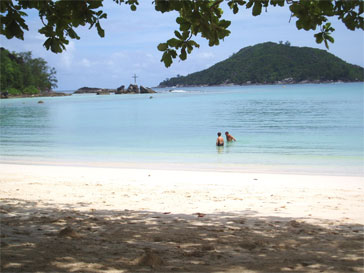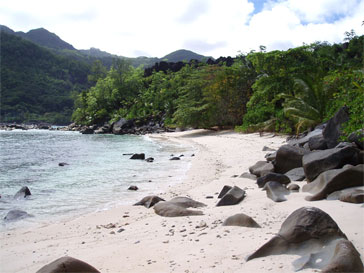 May 12, 2006
May 12, 2006The calm and tranquil Port Launay lagoon. The Seychellois is about to lose access to this beach which is safe all year round and popular with families.
 May 12, 2006
May 12, 2006BEACH ACCESS LAWS IN
THE SEYCHELLOIS MUST HOLD ON TO THEIR
“COMMUNITY RIGHTS”
A great deal has been said and written over the years on the question of public access to the beach areas in
This is an interesting development and it is essential that the Seychellois Community take note and stock of what is actually taking place. If the community allows this situation to persist, Seychellois will have access to only a few of the less attractive beaches on Mahé and else where, some of them accessible to families only half the year on account of the monsoons. The question is whether the community has an “undeniable right” of access to the Seychelles beaches. A reflection upon the available laws in However, the “enjoyment of this right” is “qualified” to the extent that, it “may be subject to such limitations as may be prescribed by law and necessary in a democratic society” (“in the public interest” amongst others not related). The “public interest” concept does not extend to the question of “private interest”. The qualification in the Constitution does not extend to the government or the property developers (Hoteliers or others), rights, denying Seychellois access through properties they have developed, to beaches which Seychellois have traditionally had unimpeded access. Article 39 (1) of the Constitution provides that “The state recognises the right of every person to take part in cultural life and to profess, promote, enjoy and protect the cultural and customary values of the Seychellois people, subject to certain restrictions that may be provided by law and necessary in a democratic society including – (a) the protection of public order, public morals and public health (b) the prevention of crime (c) the protection of the rights and freedoms of other persons”. It may be persuasively argued that the “right to enjoy and promote and protect” cultural values, extends to the ability of Seychellois to continue to gain access to and utilise the beaches of Rights persist beyond the sale of the property Article 39(2) of the Seychelles Constitution indicates thus: “The State undertakes to take reasonable steps to ensure the preservation of the cultural heritage and values of the Seychellois people”. This extends to guaranteeing the Seychellois Community its right to practice its cultural traditions including the enjoyment of its traditional places of leisure. A second piece of legislation, which supports the Constitution, is the Land Registration Act, (Sec 23), Rights of Proprietors; which provides that: “The rights of a proprietor … shall be rights not liable to be defeated except as provided in this Act, and shall be held by the proprietor free from other interest and claims whatsoever, but subject to clause (b) to “the overriding interests” set out in section (25)”. This section (25), in relation to “overriding interests” provides that: “Unless the contrary is expressed in the register, all registered land shall be subject to such of the following “overriding interests”, as may for the time being subsist and affect the same without their being noted on the register: - a) “easements subsisting (existing), at the time of first registration under this Act”. An easement under the Act may be considered as a right of way, access, road or pathway defined as “a servitude and includes the right of occupation”. This effectively means that “where a parcel of property is sold by either government or another proprietor to a third party, i.e. for the construction of a hotel etc, the existing easements, persist beyond the sale of the property, suggesting that these easements are effectively public areas of access. The proprietors do not therefore have the right to restrict access to the beaches through their properties, where there was in existence a right of way enjoyed by the community before they obtained title to the property. An “easement” is defined as: “A right enjoyed by the owner of land (the dominant tenement), to a benefit from other land (the servient tenement). An easement benefits and binds the land itself and therefore continues despite any change of ownership of either dominant or servient tenement, although it will be extinguished if the two tenements come into common ownership … Under Section 62 of the Law of Property Act 1925, when land is conveyed, all easements appertaining to it automatically pass with it without the necessity for express words in the conveyance”. Rights may be lost if not exercised This right of enjoyment or access by the community is further exemplified in the Seychelles Civil Code which stipulates the following provisions: Art 552(1): “Ownership of the soil carries with it the ownership of what is above and what is below”. (2): “the owner may build on it any structure …which he deems opportune…” Article 2219.(1): Prescription involves loss of rights through a failure to act within the limits established by law. (2): “It is a means whereby, after certain lapse of time, rights may be acquired or lost, subject to the conditions established by law”. This suggests that a person or community or proprietor (owner), although having rights of access may lose this right, if it is not exercised. It is therefore essential, that the community, exercise its rights of access to the beaches, in order to maintain their access in law. This may be further extended to include “encroachment: “the act of extending one’s own rights at the expense of others, particularly by taking in adjoining land to make it appear part of one’s own. If the encroachment is acquiesced in for 12 years, the land taken is considered to be annexed to the land of the person who made the encroachment”. The Civil Code of Seychelles, further stipulates that: Art 2228.(1): “A person who has control of a thing or exercises a right over it shall be held to have possession thereof…” and Art 2229: “In order to acquire by prescription, possession must be continuous and uninterrupted, peaceful, public, unequivocal and by a person acting in the capacity of an owner” and Article 2262, “ All real actions in respect of rights of ownership of land or other interest therein shall be barred by prescription after twenty years whether the party claiming the benefit of such prescription can produce a title or not and whether such party is in good faith or not”. This suggests by implication that where there is a “right of way” which has been in existence for twenty years or more, irrespective of whether it exists or not on the title, that right of way is maintained and cannot be removed by transfer to a third party. A “right of way” is defined as “the right to pass over another’s land. It may exist as a public right exercisable by anyone; as an easement for the benefit of a particular piece of land; or a licence, purely personal to the person to whom it is granted”. What is essential in all this, is that the Community as a whole, and individually, recognize that they have over time, inherited certain privileges of access to beaches and places of cultural interest to the Seychellois community. It is in their vital interest that all Seychellois act vigorously to defend and maintain these rights. One has only to visit Many Mauritian beaches are now inaccessible to the community and the proprietors actively discourage the community from traversing “their properties” to gain access to the beaches. This must not be allowed to happen in (ANON)

One of the 8 beaches at Port Launay, this one facing Cap Ternay. Is it too much to ask that the developers leave the Seychellois just one beach for the community’s enjoyment?